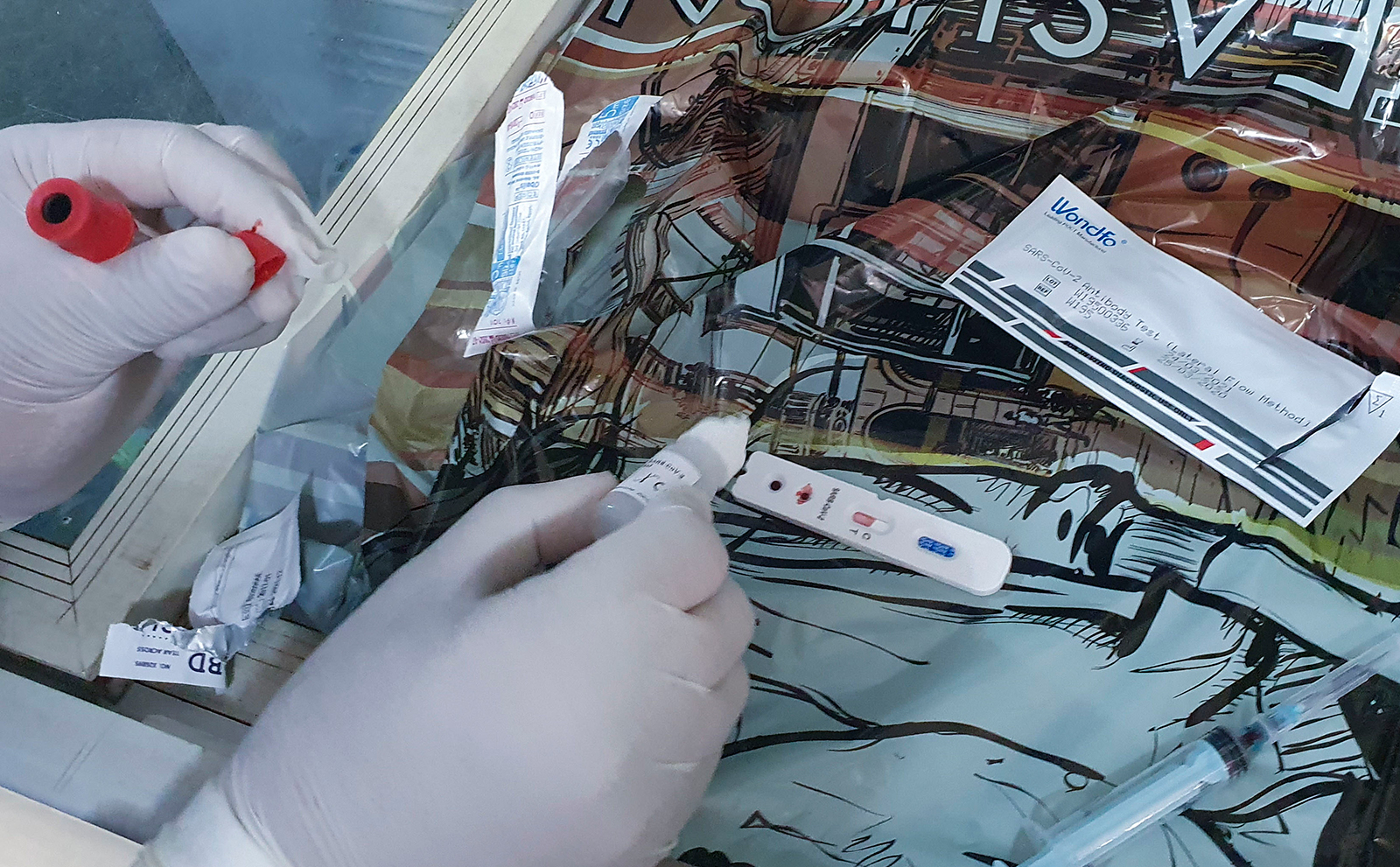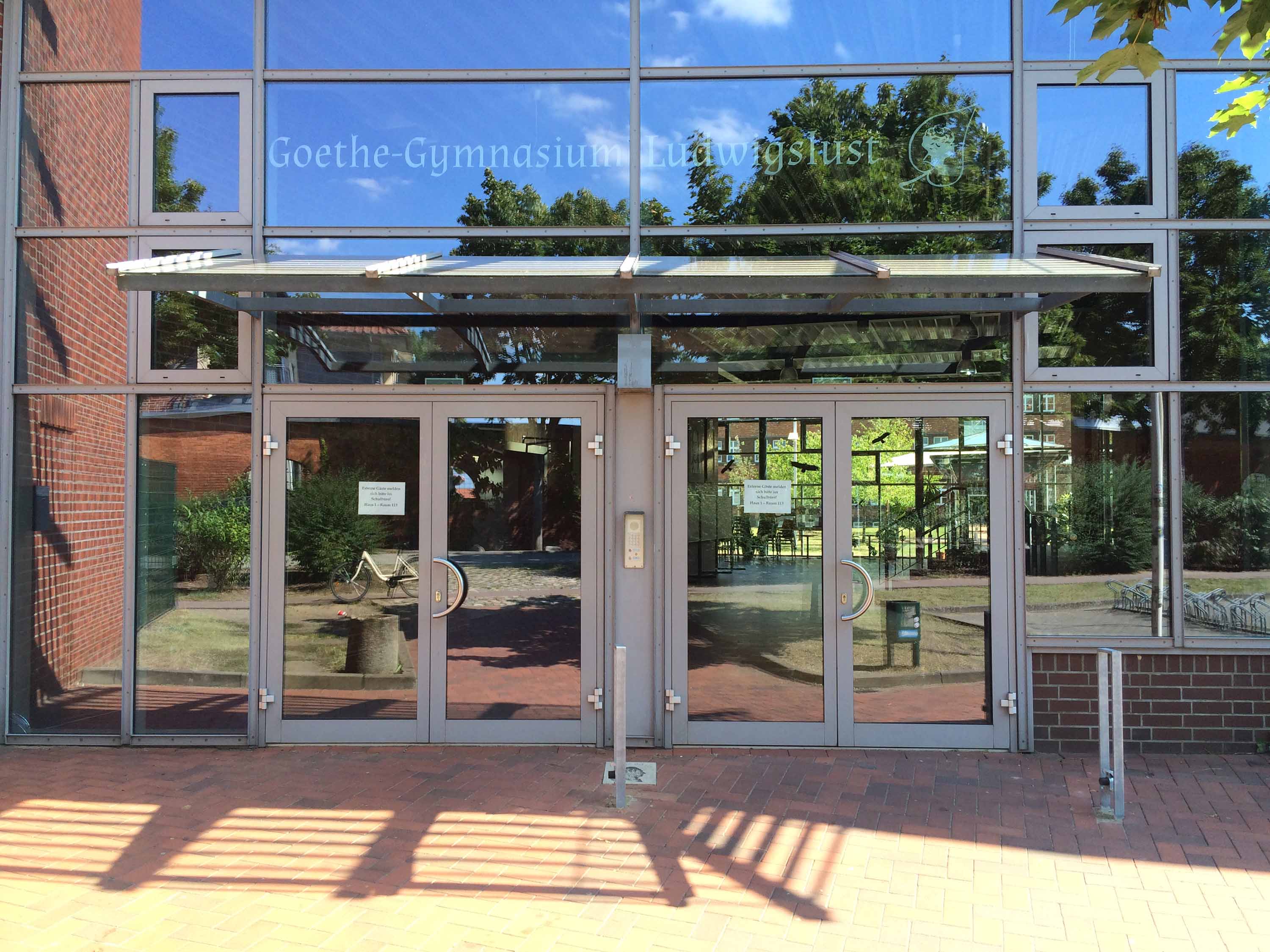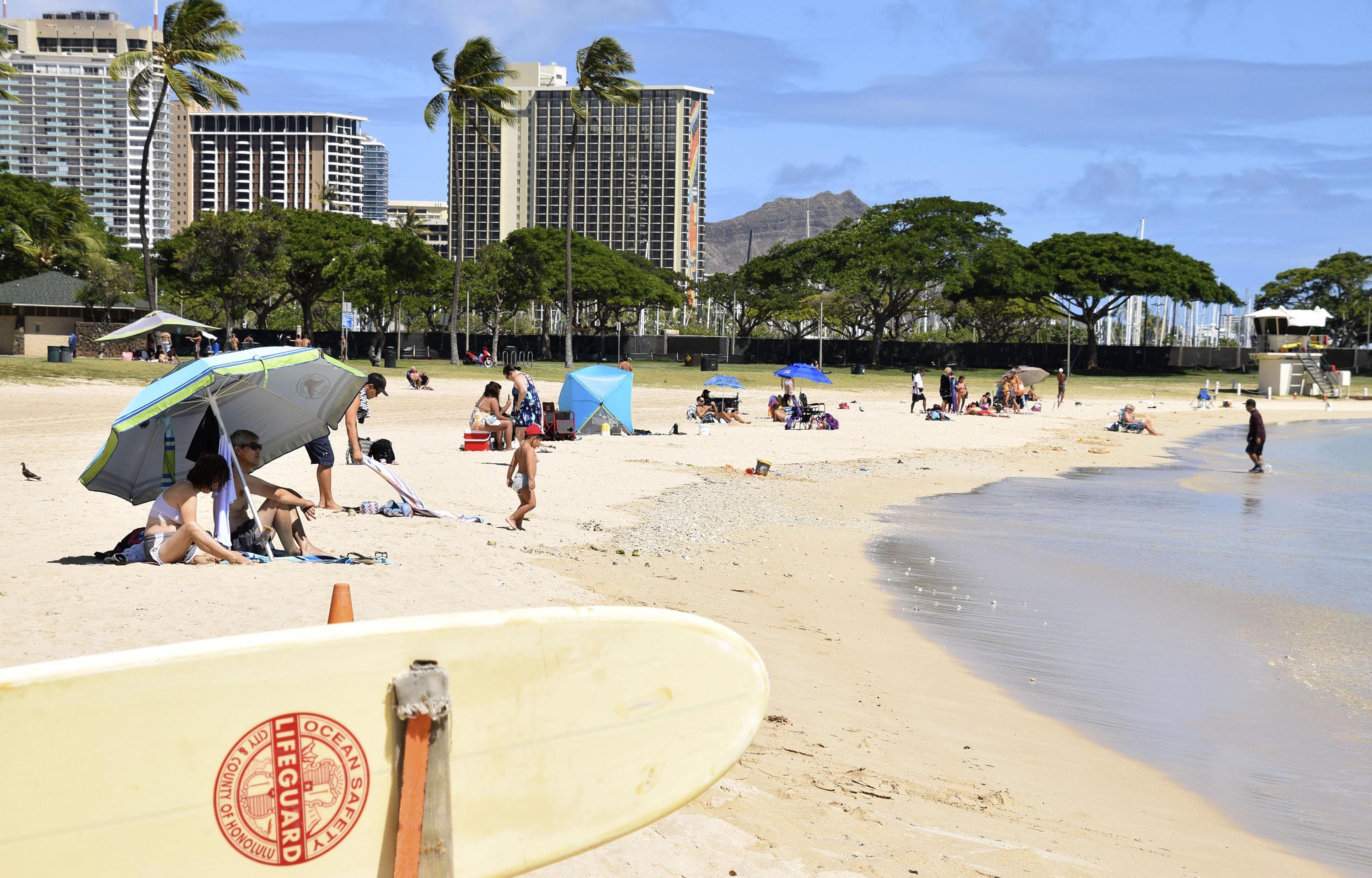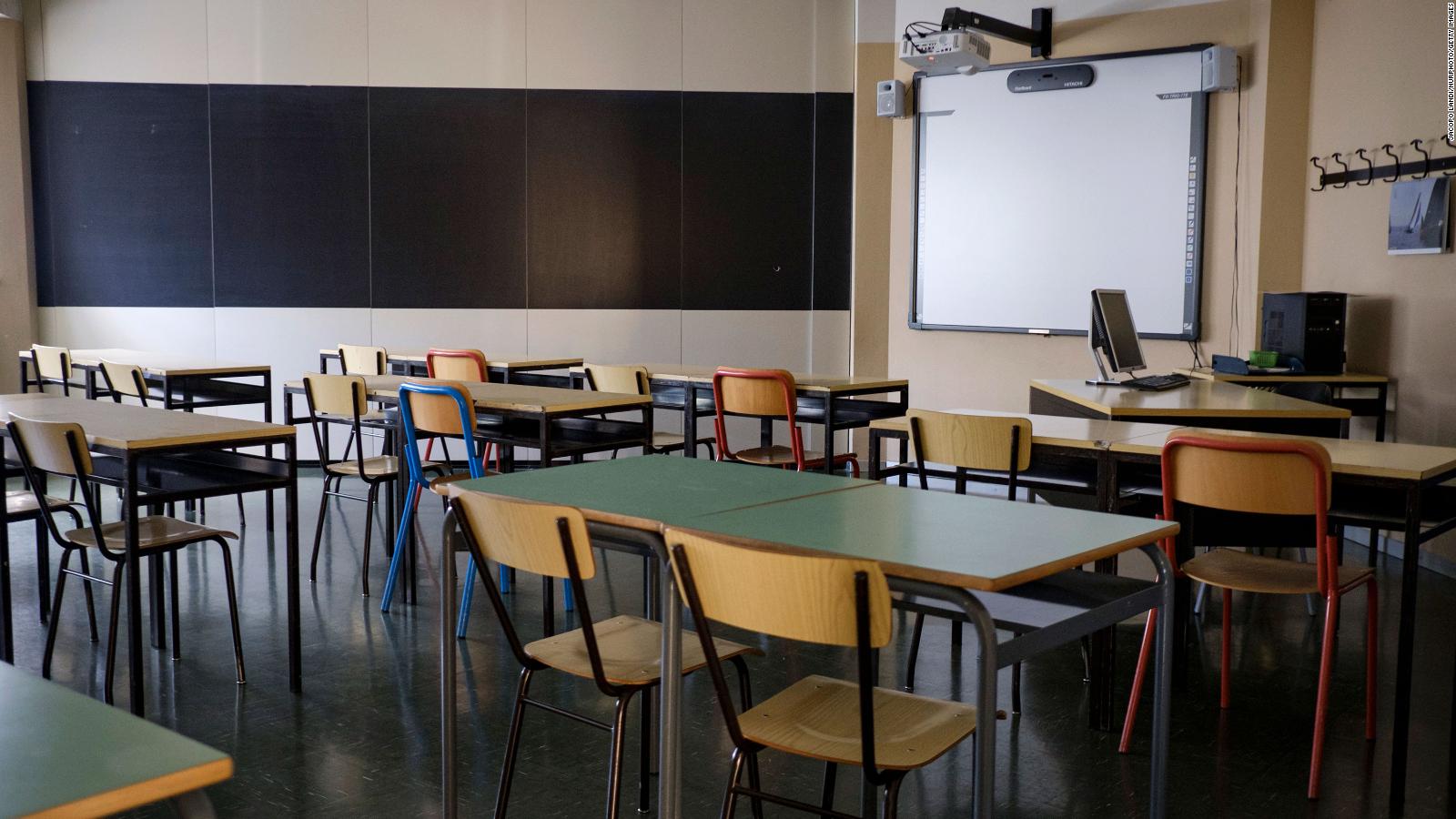The US is approaching 5 million coronavirus cases
The US has recorded more than 4,880,000 cases of coronavirus since the pandemic began, according to the latest tally from John Hopkins University.
The country often records more than 40,000 new cases daily — and sometimes more than 60,000. That means the US is on track to soon surpass 5 million total cases.
Here's a look at new daily cases for the past two weeks:

Libya reports record increase in cases
From CNN's Jomana Karadsheh in Istanbul
 A Libyan doctor tests for the novel coronavirus with a blood sample taken from a shopkeeper in the Tajura area, a coastal suburb east of the capital Tripoli, on June 1. Mahmud Turkia/AFP/Getty Images
A Libyan doctor tests for the novel coronavirus with a blood sample taken from a shopkeeper in the Tajura area, a coastal suburb east of the capital Tripoli, on June 1. Mahmud Turkia/AFP/Getty ImagesLibya reported 404 new coronavirus cases Thursday, a record high for the country.
Libya has a total of 4,879 confirmed cases and 107 deaths, according to its National Center for Disease Control (NCDC) and Johns Hopkins University, but officials fear the case count could be much higher due to the country's extremely limited testing capability.
Last week, local authorities in the port city of Misrata declared a state of emergency after a significant increase in the number of cases there.
Libya’s UN-backed Government of National Accord extended a curfew for all areas under its control by another ten days, starting on Friday.
The daily curfew will be from 9 p.m. to 6 a.m. local time, with a 24-hour curfew on Friday and Saturday.
On Thursday, the government announced new preventative measures, including making the wearing of masks mandatory in public places and on public transport.
Businesses have been ordered not to accept customers without face masks and must have clear social distancing instructions.
Firms that do not comply with these measures or the curfew hours will face fines and suspension of licenses for repeated violations, the government said.
Two German schools shut again after new cases
From CNN's Fred Pleitgen in Berlin
 Goethe High School in Ludwigslust-Parchim, Germany, is pictured on August 7. Iris Leithold/dpa/picture alliance/Getty Images
Goethe High School in Ludwigslust-Parchim, Germany, is pictured on August 7. Iris Leithold/dpa/picture alliance/Getty ImagesTwo schools in northeast Germany have closed due to coronavirus infections, state authorities announced on Friday. Both schools, the Ostsee elementary school and the Goethe High School, are in the state of Mecklenburg-West Pomerania. This was the first German state to re-open for classes, at the beginning of this week following the summer holidays.
In one of the schools, the Goethe High School, a teacher tested positive for the virus but had not yet given any lessons to students, the district of Ludwigslust-Parchim, where the school is located, announced on its website.
The school will remain shut until next Wednesday and all 55 teachers will be also be tested, local authorities said.
In the second school, the Ostsee Elementary School in the district of greater Rostock, a student tested positive for Covid-19, according to local authorities.
Rostock district said in a press release that all students and staff will be quarantined.
On Thursday the German government voiced concern over a recent spike in infections across the country, and urged citizens to follow pandemic rules like social distancing, mask wearing and sanitizing more closely.
It's 1 p.m. in London and 8 a.m. in New York. Here's what you need to know
The novel coronavirus has infected more than 19 million people worldwide and caused more than 715,000 deaths. Here's the latest on the pandemic:
CDC shuts buildings after virus shutdown leads to Legionnaire's disease risk
From CNN Health's Maggie Fox
 Legionella colonies are seen illuminated using ultraviolet light, cultured on an agar plate. Centers for Disease Control/Smith Collection/Gado/Getty Images
Legionella colonies are seen illuminated using ultraviolet light, cultured on an agar plate. Centers for Disease Control/Smith Collection/Gado/Getty ImagesThe US Centers for Disease Control and Prevention (CDC) says it has closed several buildings it leases in Atlanta because Legionella bacteria have been found in their water systems -- bacteria that likely grew because of the prolonged pandemic shutdown.
It's a problem that people across the country need to be on the lookout for, the CDC says. The bacteria, which can cause deadly pneumonia, grow in warm or stagnant water.
The plumbing in buildings that have been closed for months because of the coronavirus pandemic could provide a perfect breeding ground for Legionella and other waterborne pathogens, the CDC cautions.
It even happened to the CDC itself.
"Despite their best efforts, CDC has been notified that Legionella, which can cause Legionnaires' Disease, is present in a cooling tower as well as in some water sources in the buildings. Out of an abundance of caution, we have closed these buildings until successful remediation is complete."
Passports for sale: How the super-rich have boosted their travel options in a pandemic
From CNN's Kate Springer
For most people, the pandemic has meant fewer travel options. Not so for super-rich families who are increasingly using their money to cross borders that would otherwise be closed to them.
This is the elite world of investment migration, where passport applications are based not on nationality or citizenship, but on wealth and the willingness to move it around the planet.
These so-called citizen-by-investment programs, or CIPs, are currently a growth industry, as are residence-by-investment arrangements, also known as "golden visas."
They're a way for ultra-rich individuals to not only diversify their portfolio by moving their money into a country, but also receive the benefits of citizenship, including a new passport.
Over the past five to 10 years, the primary motivations amongst CIP participants -- who tend to have a net worth of anywhere from $2 million to over $50 million -- have been freedom of movement, tax benefits and lifestyle factors, such as better education or civil liberties.
But with Covid-19 dramatically transforming our 2020, some elite families are also considering healthcare, pandemic responses and potential safe havens to ensure they have a backup plan for the future.
Hawaii reinstates inter-island travel quarantine as Covid-19 cases surge
From CNN's Hollie Silverman
 Visitors are seen at Ala Moana Beach in Honolulu, Hawaii, on July 29, amid the novel coronavirus outbreak. Kyodo News/Getty Images
Visitors are seen at Ala Moana Beach in Honolulu, Hawaii, on July 29, amid the novel coronavirus outbreak. Kyodo News/Getty ImagesHawaiian officials are tightening restrictions after a surge in Covid-19 cases and hospitalizations statewide -- with the majority of the cases on the island of Oahu.
About 200 new cases and two new deaths were reported Thursday, Gov. David Ige said.
There is no question that the virus is surging," he said. "This is the last thing that we wanted to do ... As we reopen our community people let their guard down. It's been very disappointing."
Ige announced that a 14-day inter-island travel quarantine will be in place starting August 11 to stop further spread to other islands.
Bruce Anderson, Director of Hawaii Department of Health, said 117 Covid patients are in the hospital statewide, with 115 of them on Oahu.
More than 53% of the ICU beds on the island are filled, he said.
Virus cases are soaring among younger people, WHO says
From CNN's Madeline Holcombe
The Covid-19 pandemic is moving into younger populations, health experts said Thursday, with cases skyrocketing among children, teens and young adults.
Early in the outbreak, health experts stressed that older adults were most at risk for the virus that has infected more than 4.8 million people in the United States, but new data from the World Health Organization (WHO) shows that most cases -- by far -- are reported in people aged 25 to 64. The proportion of cases in teens and young adults has gone up six-fold, and in very young children and babies the proportion has increased seven-fold, WHO said.
The increase might be explained by broader testing, greater detection of milder cases and shifting demographics of hotspots, but "a rise in risky behavior after easing of public health and social measures" is also to blame, WHO said.
Italy prepares to return to school ... with saws
From CNN's Barbie Latza Nadeau and Valentina Di Donato
 An empty classroom is pictured in Trieste, Italy, on May 26. Jacopo Landi/NurPhoto/Getty Images
An empty classroom is pictured in Trieste, Italy, on May 26. Jacopo Landi/NurPhoto/Getty ImagesItaly, the first Covid-19 epicenter outside of China, has used an aggressive testing regime and face coverings to beat back a second wave of the pandemic so far. But as the nation's children prepare to return to the classroom, many schools are taking matters into their own hands -- by chopping up the furniture.
Social distancing is vital to mitigate the spread of coronavirus, but most Italian schools still use old-fashioned "banchi," or benches, that seat multiple students to save space in their cramped classrooms. Single desks are rare, especially in the lower grade levels.
Italy's Education Ministry put out a Europe-wide tender earlier in July for three million single-seat desks. A decision is expected on that soon -- for delivery by September 8, so schools can assemble the new furniture by the time students return in the middle of the month.
But many districts are concerned the new desks won't arrive in time, so they are preparing to take matters into their own hands by sawing up the old benches.

 5 years ago
544
5 years ago
544 

